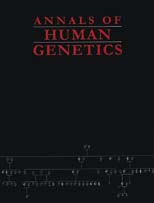No CrossRef data available.
Article contents
Assessment of new markers for the rapid detection of aneuploidies by quantitative fluorescent PCR (QF–PCR)
Published online by Cambridge University Press: 09 January 2002
Abstract
Rapid prenatal diagnoses of major chromosome aneuploidies have been achieved successfully using quantitative fluoresent PCR (QF–PCR) assays and small tandem repeat (STR) markers. Here we report the results of evaluating the use of previously untested X-linked STRs, (DXS6803) and (DXS6809), together with modified amelogenin (AMXY) sequences and the X22 marker that maps in the pseudoautosomal region PAR2 on the long arm of the X and Y chromosomes. These markers will allow prenatal diagnoses of sex chromosome aneuploidies such as 45,X (pure Turner Syndrome), 47,XXY and 47,XYY, while assessing the sex of the fetuses. Data are also presented concerning the difficulties associated with the evaluation of the frequencies of the various types of sub-populations of cells in amniotic fluid samples collected from fetuses with sex chromosome mosaicism. The results of evaluating the use of new markers for the rapid diagnosis of aneuploidies affecting chromosomes 21,18 and 13 are also presented. Three chromosome 21 specific STRs have been found to produce trisomic triallelic or diallelic patterns from all amniotic samples retrieved from fetuses with Down Syndrome. Since all samples tested were amplified and no false positive or negative results were observed, the present results confirm the diagnostic value of QF–PCR for the prenatal detection of major numerical chromosome disorders.
- Type
- Review Article
- Information
- Copyright
- University College London 2001




